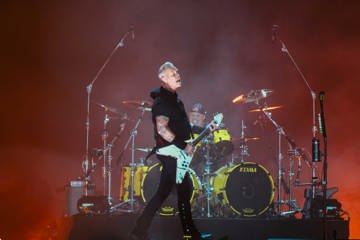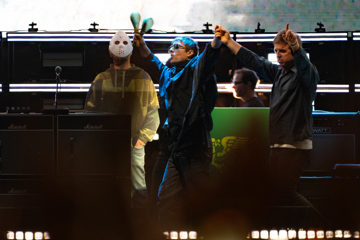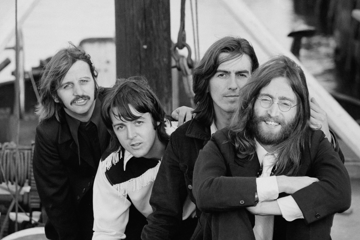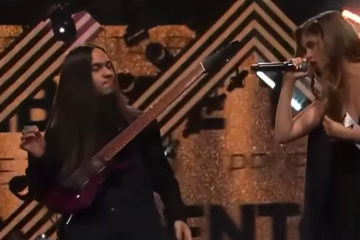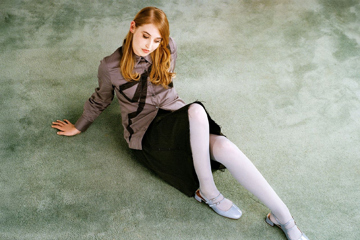Game Buoys
Deep Sea Arcade bassist Nick Weaver tells Tyler Mcloughlan how girls, good vibrations and Noel Gallagher all helped to shape Outlands.

Sydney's Deep Sea Arcade have been slowly romancing Australia with the mysterious psychedlia of their cleverly executed indie rock since their song Crouch End dropped in 2008. With a host of radio friendly singles including Don't Be Sorry and Lonely In Your Arms endearing frontman Nic Mckenzie's eerily melancholic vocal to national audiences, they signed to Ivy League last year. 2012 is the year their songs, some almost a decade old, find form on their debut album Outlands.
“We're feeling great – it feels like an accomplishment, it's been such a long time coming,” bassist Nick Weaver offers from his back porch, clad in a dressing gown he intends to stay in all day now the record is complete. “We held [the albums] for the first time yesterday and it was like this massive kind of weight lifted…
“We stole as many as we could. I don't know whether that's stealing from ourselves or what?” he laughs, before commenting seriously on the long lead time of Outlands. “It's felt like ages. I guess that we're pretty crazy perfectionists and I think a lot of the time that's really, really good – sometimes it makes things take a little too long – but I don't feel like the album's over-cooked. I think it's actually a really good time for it, and I think that by releasing all these singles and stuff, we've built up to a comfortable level where we're ready to release an album. It's so easy to do that too early – a debut album's a big deal, it should be an event that kind of makes a bit of an impact.”
Their level of perfectionism is truly realised once it's revealed that Weaver and Mckenzie have been collaborating since their early teenage years, and whilst Outlands includes new and old material, much of it is based on ideas the pair have had rattling around for many years.
Don't miss a beat with our FREE daily newsletter
“[Title track] Outlands is probably four years old, and that song Together, that's probably about nine years old. Some of them, it's funny, the last one Airbulance, we were in our early to mid-teens when we started working on that. With Together, there was an initial idea for it – I recorded this guitar part when I was in my teens – and it kind of never really amounted to anything and then we listened back to it when we'd moved out of home and stuff and it was like, 'Oh, that thing's actually really cool!', and it became something entirely different. So a lot of them get developed a lot from where they begin and revisited over a lot of time before they become what's on the album – there's a recording of lots of different moments in our writing partnership in one song.”
In a show of confidence the title track sits proudly in pole position, immediately identifiable as Deep Sea Arcade from the opening strum, though it doesn't have the profound meaning that may be expected from an outfit so long in preparation for this moment.
“I think it was just a title that we thought was fittingly cinematic for the album, and just a nice image – I don't think it was necessarily the song that gave the album the title but the fact that we thought it would work,” Weaver explains. “The song's a hard one – when we first started making that one it was almost like a kind of a beatsy sort of Portishead thing, like really dark, and we ended up working on it with the band and it got that kind of Led Zeppelin-y outro and it just became more of a rock song… We wanted to open the album with something that wasn't one of the poppier songs; we wanted to set a certain kind of darker pace. It was either put it first or put it at the end and we just wanted to be a little bolder.”
Weaver is very clear about the Deep Sea Arcade mission, developed after years of experimentation and through keeping a keen ear on the musical devices of much respected genre pioneers.
“Definitely beats music was something we listened to a lot when we were kids – we were deeply into Portishead and Massive Attack as well as DJ Shadow and Amon Tobin and things like that. Drums-wise we've always tried to incorporate a big beat kind of thing into what we love about songwriting, which is I guess things like The Beatles, The Kinks, The [Rolling] Stones. We've always tried to kind of flesh songs out like bands like The Beatles would – every moment is followed by a moment that is kind of even more exciting than the last,” he enthuses. The songwriting greats have even left their mark on lyrical themes, of which Weaver admits girls are an oldie but a goodie. “It's always such a great thing to write about. Everybody has relationships. I always remember that Beach Boys movie where Brian Wilson is writing Good Vibrations, and he's writing about how dogs can hear everything with vibrations, and the other guy sits down and he's like, 'Nah, it's really good, but lets make it about girls – everyone can relate to that.'”
Kicking off 2012 supporting Noel Gallagher's High Flying Birds also gave the five-piece a chance to further recognise historical influences.
“[We] got to go back and listen to heaps of Oasis and get back into it, and you kind of realise when you revisit those things, how much they rubbed off on you,” Weaver admits, before switching to a high pitched squeal to highlight his enjoyment of the tour: “It was killer! He was so sweet. I wouldn't have been surprised if we never even saw him, but he watched us there, and so did his band, and they were so sweet – they hung out afterwards.”
For now, Weaver can relax in his dressing gown and bask in the big deal that he believes a debut album should be.
“Argh, so stoked,” he exclaims in summary. “There's such a feeling of relief… but it also breathes a new life into [the album] – we can't wait to play it now that it's done, even though we have played a lot of it for a little while. It gives it a new kind of freshness and we're really stoked about putting it out.”

